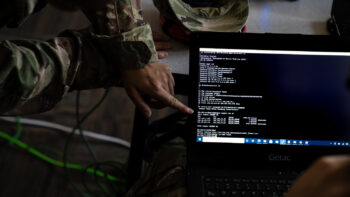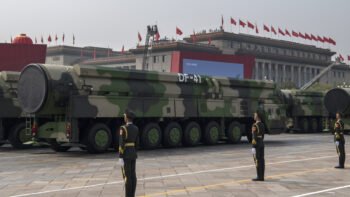 [UPDATED with details on carriers] THE CAPITOL: With the Obama Pentagon excoriating federal lawmakers for their apparent inability to avoid sequestration or to pass a defense spending bill, and the Navy going down to one carrier in the Persian Gulf for lack of funds, GOP lawmakers today defended the latest Republican proposal to stop the automatic budget cuts.
[UPDATED with details on carriers] THE CAPITOL: With the Obama Pentagon excoriating federal lawmakers for their apparent inability to avoid sequestration or to pass a defense spending bill, and the Navy going down to one carrier in the Persian Gulf for lack of funds, GOP lawmakers today defended the latest Republican proposal to stop the automatic budget cuts.
It isn’t a mere rehash of a very similar one that fizzled last year, GOP leaders insisted when Breaking Defense raised the question at a press conference in the Capitol this afternoon — although their own staff seem to disagree (click here to read why).
The difference may be less the substance than the timing, they admitted: The situation has gotten so much worse than any solution looks a lot better.
When I asked how the new plan — to buy back a year of sequestration cuts by shrinking the federal workforce over a decade — was different from the version proposed a year ago, the first legislator to leap in was the irrepressible and irascible John McCain:
“It’s a year later,” the Arizona senator said.
“Last year things weren’t desperate,” said Sen. James Inhofe, who has succeeded McCain as the ranking Republican on the Senate Armed Services Committee. “This president has done everything he can to hide from the people the devastating effects of the sequestration and the CR” — the Continuing Resolution now funding the government on autopilot in the absence of a proper spending bill — but, said Inhofe, recent testimony by administration officials themselves have made clear the cuts would be “devastating.”
So, asked another reporter, is the situation “desperate” enough that Republicans would accept further tax increases to stop defense cuts?
“It’s not desperate enough that you can start raising taxes when you can do it without raising taxes,” Inhofe replied.
Frank Kendall, undersecretary of Defense for acquisition, technology and logistics, believes the situation is dire. In fact, he called Congress’ inaction “utterly unconscionable, utterly unconscionable” especially as troops in Afghanistan worry they may be furloughed. They won’t be, but Kendall — speaking in New York to a roomful of several hundred New York financiers — just returned from Afghanistan and he was visibly upset when he spoke.
And the Pentagon upped the ante a few hours later: The Navy has decided to delay deployment of the aircraft carrier USS Harry S. Truman because of the threat from sequestration.
At a time of rising tensions with Iran, that will leave the fleet with only one carrier in the Gulf region “for the foreseeable future,” a Defense Department official told Breaking Defense.
“Facing budget uncertainty — including a Continuing Resolution and the looming potential for across-the-board sequestration cuts — the US Navy made this request to the Secretary and he approved,” Pentagon Press Secretary George Little said in a statement. “This prudent decision enables the U.S. Navy to maintain these ships to deploy on short notice in the event they are needed to respond to national security contingencies.”
Budget uncertainty from Washington gridlock and maintenance problems from a decade of war have forced the Navy to play a complicated shell game with its already-reduced carrier fleet, now down to 10 flattops with the retirement of the USS Eisenhower. When the aging USS Nimitz had an unexpected problem with a cooling pump, it couldn’t sail out to replace the USS Eisenhower, which was patrolling the Gulf alongside the USS Stennis — so the Navy brought Eisenhower home ahead of schedule (and in time for Christmas) to do its repairs; when that’s done, in March, they’ll send Eisenhower out again to replace Stennis, which has been sailing on alone.
It would have been possible to keep two carriers in the Central Command theater for now, the defense official acknowledged, but then the Navy would have run out of operations funds before the end of the fiscal year and gone down to zero carriers.
“If we’d sent two carriers over… any combination of two carriers… we would have run out of carrier presence before the end of the year was over, because of the budget, because of the CR [Continuing Resolution],” the official explained. “It’s really a 1-2-3 punch: 10 years of war, no appropriations bill, and then sequestration.”
In contrast to such painful expedients, the GOP’s Buck McKeon, chairman of the House Armed Services Committee, argued their new bill is “as painless as possible.”
Whereas sequestration would cut almost every discretionary program — i.e. not entitlements like Social Security — by the same amount, the GOP proposal would put the entire burden on the federal payroll, but it would spread the impact out over time, replacing the first year of sequestration cuts with 10 years of workforce reduction via attrition: The government could only hire one new civil servant for every three that leave.
In fact, one of the few differences from last year’s stillborn bill is that the size of the cut would be somewhat smaller: $85 billion over ten years in the current plan vs. $127 billion in the version McKeon introduced last year. That’s possible because, again, of timing: The sequester was originally set to take effect in January, but the New Year’s Day deal delaying it to March also paid off the first few months of sequestration by raising taxes.
The new bill also includes a freeze on congressional pay and combines provisions from the separate House and Senate versions from last February, “so we’re on the same page,” said Sen. Kelly Ayotte, the up-and-coming conservative who is the lead Senate sponsor.
The entire proposal buys back less than a year. The government would still have to find the other nine years of sequestration cuts — almost $1 trillion — somewhere else. Republicans made it very clear that mandatory entitlements like Social Security, Medicaid, and Medicare, which make up more than half the federal budget, must be on the table.
“We all agree that in the big picture here as we go forward…. that we have to reform entitlements, no question,” Ayotte told reporters after the formal press conference. “This proposal comes up with spending cuts to allow us to get to the end of this fiscal year” — and to give Congress time to think about a bigger deal.
For now, though, the pressure is on to get any fix, however short-term, to avert cuts set to start in less than a month. And the GOP wants to make sure Democrats get the blame.
“The president has a proposal — I don’t think it’s sound, but let’s vote on it,” implored Sen. Lindsey Graham. “It’s one thing to be the world’s most deliberate body; it’s another thing to just be absent.”
While the GOP-controlled House has passed stop-sequester bills, “we’ve done nothing in the Senate,” Graham said, directly urging Senate Majority Leader Harry Reid (a Democrat) to schedule a debate.
Addressing President Obama, the visibly distressed Graham went on: “We bear responsibility as Republicans for allowing this to happen — lead us to a better situation. If you do not, Mr. President, you will go down as one of the most irresponsible commanders in chief in the history of this country.”
Leaked memos from the Army, Air Force, and Navy over the last few weeks detail the damage that would be done to military readiness, from cancelled training to deferred maintenance.
“What’s changed,” McKeon said at the end of the press conference — returning to the podium as his colleagues started off to take one last shot at a question that had clearly bothered him — “[is that] up until December, the Joint Chiefs were commanded not to plan for sequestration. Now they have had time to look at it and we’re going to hear next week” — at a hearing McKeon will hold — “some very specific things they’ve told me about in the last couple of days… that when the call comes they might not be able to respond.”
“When the American people find that out,” McKeon promised, “there’s going to be some real change.”
From Boeing’s struggles to inflation relief funds: 5 industry stories from 2024
Making a year-end list in which she forces references to Taylor Swift songs for no reason has basically become reporter Valerie Insinna’s favorite Christmas tradition.


























